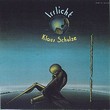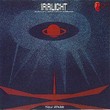|
|

From head to heart Following our retroscope series of latter years, here we go again! Here's Speakers' corner's cousin; From head to heart. Luna Kafé's focused eye on great events, fantastic happenings, absolute milestones, or other curious incidents from the historic shelves'n'vaults of pop'n'rock. Blowing our ears and our head, punching our chest and shaking our heart. Making us go sentimental, but not slaphappy. This moonth the Lunar spotlight revisits yet another 40 year old German platter,; a label mate with and an ex-member of last moonth's electronic dream machine. Yet again the subject/content is electronic drone music. This is an early album of the ambient genre. And, believe it or not; it's a synth-free zone. All you have to do is drone...
Klaus
Schulze This is the second reminiscence of an Ohr record in a row, both released in the same month of the summer 1972. We promise it will be the last Ohr record to be part our menus for quite some time. Anyhow, Klaus Schulze's debut solo album is as worthy a contender as Tangerine Dream's Zeit was one full moon back. As mentioned last full moon, Klaus Schulze was the drummer of the Tangerine Dream line-up that recorded the debut album Electronic Meditation. He left the band before the album was released, was part of Conrad Schnitzler's group Eruption for a little while before he and two other Eruption-members, guitarist Manuel Göttsching and bassist Hartmut Enke left to form Steeple Chase Bluesband instead. The band changed name to Ash Ra Tempel and Klaus participated on the band's classic self titled debut album before he went solo. What might we expect from a drummer's first solo album...? 40-50 minutes of drum solos, you might wonder? Not at all! There are hardly any signs of drums or percussive instruments on Irrlicht. Edgar Froese, the leading man of Tangerine Dream, and Klaus Schulze were among a young generation of German musicians that wanted to bring new and serious elements into modern day popular music in the second half of the 1960s. Edgar saw the light when he met Salvador Dali in Spain while visiting the country with his beat-band The Ones in 1965. He wanted to do the same with music as Salvador had done with painting. Back in Berlin, the young musicians went to lectures with serious and groundbreaking composers like György Ligeti, Carl Dahlhaus, Karlheinz Stockhausen and Luciano Berio. John Cage and Terry Riley from the States were also an inspiration. I don't quite know. To me the early works of Tangerine Dream and Klaus Schulze seem more inspired by the first three Pink Floyd albums. Not the whimsical English fairytale stuff, but the atmospheric and outer-atmospheric instrumental excursions. The title track of Floyd's second longplayer A Saucerful of Secrets (1968) springs to mind. "Main Theme" from the soundtrack album More (1969) sounds as the godmother of Tangerine Dream's later melodic stuff. Irrlicht has a subtitle: Quadrophonische Symphonie Für Orchester Und E-Maschinen, meaning Quadraphonic Symphony For Orchestra And Electronic Machines; a symphony in three movements, no less! The album doesn't sound very symphonic, though, apart from a few quite short and almost pompous organ parts in the first movement. It was never released as a quadraphonic album and there aren't many electronic machines around, as far as I can hear. No synthesizers anyway. There is a small orchestra involved, the Colloquium Musica Orchestra, with strings, brass and woodwind. These traditional instruments can be hard to discern in between the organs and other sound vehicles produced by Klaus himself. They might be involved throughout, but Klaus has used effects (probably phaser and fuzz at least) and manipulated the tapes he recorded with the classical as well as his own instruments so it's not always easy to find out where the sounds stem from. At times Irrlicht sounds as an expanded step-brother of "A Saucerful Of Secrets", the mainly instrumental Floyd track, or a shorter ditto of Tangerine Dream's Zeit. The Floyd track starts very quiet and careful, builds up into a crescendo of guitar and organ mayhem before a happy and harmonic organ finale. Irrlicht starts less quiet, never grows that noisy and the harmonic organ part doesn't last long, doesn't finish the symphony and is never that harmonic. Like Zeit, the classical instruments only dominate for a few minutes at the start of the album. There are droning parts as well, atmospheric or outer-atmospheric glissando guitar, it seems, at least half of the album is non-melodic, still no-noisy, moody stuff, as with Zeit. The first movement of the symphony, the 23 minutes plus "Ebene" includes most of the melodic moments and works as the gateway into the album. But there seems to be some eerie stuff underneath all the way through and it gets more importunate in the second half of the movement. Irrlicht means something like a blue light stemming from creatures living underground, something like fairies or goblins, only more scary. So the symphony is maybe not as cosmic as the Floyd excursions or Zeit as one might expect at first. Maybe it's directed towards inner space, the mind, instead? Human beings' fear of the unknown in their local surroundings, underneath the ground - or the subconscious, in the dark,... In the excellent krautrock-encyclopedia The Crack In The Cosmic Egg, Alan and Steven Freeman describes the music of Irrlicht as 'hurtling into the nether regions of infinity'. Let's add the nether regions of the mind, too. So then, after all, Irrlicht is a one of a kind album both in comparison with other bands and artists, but also of the Schulze cannon. I was surprised when I read that the album didn't include any synthesizers and even more so that the entire third and last movement of the symphony "Exil Sils Maria" is played backwards on the album. And Klaus gets away with it. It really works! Klaus went back to record one more album with Ash Ra Tempel before he concentrated completely on his solo career with synthesizers centre stage. He has by now released around 50 ordinary studio and live albums in his own name and his alter ego Richard Wahnfried. In addition he has released several voluminous CD-boxes with previously unreleased material; the biggest of them including 50 CDs... Also, several of his ordinary albums have been re-launched with bonus material in later years on the Revisited Records label, including Irrlicht. I guess Irrlicht is not a representative Klaus Schulze album. On the other hand it's fascinating in its own right. Copyright © 2012 JP
|
| © 2012 Luna Kafé |

